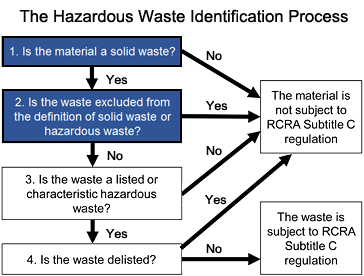The smart Trick of Reclaim Waste That Nobody is Discussing
The smart Trick of Reclaim Waste That Nobody is Discussing
Blog Article
Some Known Facts About Reclaim Waste.
Table of ContentsNot known Incorrect Statements About Reclaim Waste Reclaim Waste Fundamentals ExplainedSome Of Reclaim WasteReclaim Waste - An OverviewReclaim Waste Things To Know Before You Get This
Via appropriate fluid waste management, business can lower energy-intensive therapy procedures and disposal expenses. By following a system for handling fluid waste, firms can stay clear of expensive fines and fines and avoid negative promotion.(https://issuu.com/reclaimwaste1)Collect depictive examples from various factors within the waste stream to guarantee precision. Fluid waste, particularly harmful ones, positions substantial dangers during this step.

Disinfection (e.g., chlorination, ultraviolet light, ozonation) and nutrient removal (e.g., denitrification and phosphorus removal) are advised under rigorous policies. Countless firms went against a number of fluid waste disposal regulations in recent years.
A Biased View of Reclaim Waste

are used by markets that generate big volumes of low-toxicity liquid waste. Superficial basins include liquid waste that is allowed to evaporate with all-natural processes. The residue left can be taken care of in land fills. entails shedding fluid waste at high temperatures and converting it into gas and ash. This kind of disposal undergoes rigorous ecological policies because of possibly harmful emissions.
The findings need to be documented, evaluated, and kept not simply for submission to regulative authorities but likewise for making improvements in the future. Share information with pertinent stakeholders (e.g., staff members, governing federal government firms, and neighboring neighborhoods) to maintain openness and responsibility.
Comprehending these can aid them effectively handle their operations and decrease their ecological influence. Companies that can't spend in facilities need to take into consideration collaborating with the public industry for much better solutions.
Some Ideas on Reclaim Waste You Need To Know
By executing detailed monitoring systems that consist of therapy and reusing methods, normal monitoring, risk assessments, and adherence to regional and federal laws, industrial centers can add to the protection of groundwater products, ensuring their schedule for future generations (industrial wastewater treatment). Allow's explore the significance of efficient fluid waste administration in the commercial market, concentrating on its effects for guarding groundwater resources
The pollution of groundwater resources because of incorrect fluid waste administration in the industrial field has far-ranging repercussions for human health, agriculture, and the atmosphere overall. Some of the potential impacts created by such air pollution include: Polluted Drinking Water Materials: As groundwater provides a substantial portion of our drinking water, pollution from industrial activities can lead to unsafe chemicals and bacteria entering our water systems, presenting health risks for human beings.
Minimized Agricultural Performance: Farming counts heavily on groundwater for irrigation; for that reason, polluted water can prevent plant yields, infect farming items, and influence food safety and security. Provided the significance of maintaining groundwater resources, it is critical for companies to take a positive stance in managing their fluid waste sensibly and stopping contamination.
Excitement About Reclaim Waste
Liquid waste can contaminate land and pollute waters. Information regarding dealing with and saving liquid waste, reacting to spills and reducing liquid waste is offered in the adhering to truth sheets and guidance:.
Water, the significance of life, is under continuous risk from contamination. The role of waste management professionals in protecting this precious source can not be overemphasized. Their solutions consist of: Septic container and oil catch cleaning: Vital for stopping hazardous toxins from entering our water systems. Polluted water and contaminated effluent management: Making sure that harmful fluids are safely eliminated and dealt with prior to they can damage our water sources.
Therefore, integrating sustainable liquid waste monitoring right into economic planning boosts financial security and safeguards the setting, showing the worth of this approach. In final thought, taking on specialist liquid waste administration practices is critical for making sure a sustainable future, securing our setting and securing the wellness of future generations.
When it concerns disposing of waste, adhering to appropriate procedures is vital for a wide range of reasons. Appropriate important source waste disposal is not just regarding sanitation; it's about making sure the health of our setting, wellness, and the effective usage of sources. Recognizing the importance of effective waste monitoring can aid all of us add to a healthier, cleaner earth.
Unknown Facts About Reclaim Waste
Efficient waste management aids preserve clean roads and public areas, minimizing the aesthetic effect of litter and ensuring that waste does not damage wild animals. When waste is not thrown away properly, it can result in contamination, where dangerous materials can leach into the soil, water supply, and the air, creating long-term environmental troubles.
Report this page